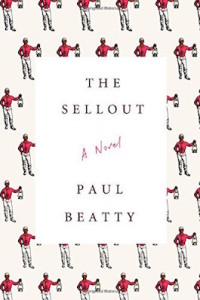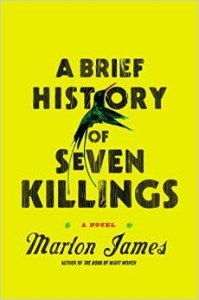Congratulations to Anna Burns, who
earlier this evening at London’s Guildhall became the 50th winner of the
Man Booker Prize—Britain’s most prestigious and high profile literary
award—when she took home the gold for her novel Milkman:
a tale of tribalism and hope set during the Troubles in Northern
Ireland, which focuses on a young woman who is forced into a
relationship with an older man.
From its inception in 1969 until 2013, only novels written by
Commonwealth, Irish, and South African (and later Zimbabwean) citizens
were eligible to receive the £50,000 prize; in 2014, however, this
eligibility was widened to any English-language novel—a change which
proved controversial, but which also opened a door for the two most
recent winners (Paul Beatty’s The Sellout in 2016, and George Saunders’ Lincoln in the Bardo in 2017) to walk through.
Now you can’t actually buy Milkman over here yet—something
which I’m sure will be rectified by a hungry publisher very soon—but
while you’re waiting, and still in Booker mode, why not take a journey
into the recent past with us, and see what the critics wrote about every
previous Man Booker Prize-winning novel of the 21st century?
2017
“…
a luminous feat of generosity and humanism … The
souls crowd around this uncanny child. As the cast grows, so does our
perspective; the novel’s concerns expand, and we see this human business
as an angel does, looking down. In the midst of the Civil War, saying
farewell to one son foreshadows all those impending farewells to sons,
the hundreds of thousands of those who will fall in the battlefields.
The stakes grow, from our heavenly vantage, for we are talking about not
just the ghostly residents of a few acres, but the citizens of a
nation—in the graveyard’s slaves and slavers, drunkards and priests,
soldiers of doomed regiments, suicides and virgins, are assembled a
country. The wretched and the brave, and such is Saunders’s magnificent
portraiture that readers will recognize in this wretchedness and bravery
aspects of their own characters as well. He has gathered ‘sweet fools’
here, and we are counted among their number … The narrator is a curator,
arranging disparate sources to assemble a linear story. It may take a
few pages to get your footing, depending. The more limber won’t be
bothered. We’ve had plenty of otherworldly choruses before, from
Grover’s Corners to Spoon River, and with so many walking dead in the
pop culture nowadays, why not a corresponding increase in the talking
dead? Are the nonfiction excerpts—from presidential historians, Lincoln
biographers, Civil War chroniclers—real or fake? Who cares? Keep going,
read the novel, Google later … the war here is a crucible for a heroic
American identity: fearful but unflagging; hopeful even in tragedy;
staggering, however tentatively, toward a better world … events
sometimes conspire to make a work of art, like a novel set in the past,
supremely timely. In describing Lincoln’s call to action, Saunders
provides an appeal for his limbo denizens—for citizens everywhere—to
step up and join the cause.”
2016
“
The Sellout makes room for both satirical spectacle and
earnest literary whispers. Beatty’s reliance on so many textured
backstories and secondary characterizations feels both revelatory and
absolutely intentional. …
The Sellout while riding beneath
terrifying waves of American racial terror and heteropatriarchy, is
among the most important and difficult American novels written in the
21st century …
The Sellout, in all its spiky satirical absurdity, exists not just in a world created by hip-hop and cradled by the Internet.
The Sellout
firmly situates itself between white supremacy and black love, between
thick anti-blackness and communal black innovation. It is
a bruising novel that readers will likely never forget.”
2015
If
A Brief History of Seven Killings can be said to have a
main idea, it’s that nobody escapes, at least not entirely, from
violence. Because violence isn’t an event, but a kind of potential—a
force, like gravity, that lurks in every curve of space …
It has less in common with most recent literary fiction than it does with Breaking Bad and The Wire…
Seven Killings
is surprising, suspenseful, and, when it stirs from its sinister
languor, fast, with action sequences as finger-curling and
eyelid-lifting as anything onscreen. But as much as it resembles the
best of today’s television, the novel conveys violence with an interior
nuance perhaps only achievable in prose. Its intensity comes less from
the story’s underworld glamour than it does from James’s style and
syntax—a language that gives texture to danger and its psychic terrain …
Some will be frustrated by its lack of ‘larger comment,’ the usual hall
pass for dangerous art. Others will find it too painful. People who
think good writing should always be graceful won’t like it at all.”
2014
“The story casts its roving eye on 77-year-old Dr. Dorrigo Evans, a
celebrated war hero whose life has been an unsatisfying string of
sterile affairs and public honors. He loved a woman once, but tragedy
intervened, and since then each new award and commendation only makes
Dorrigo feel undeserving and fraudulent … For many pages, the novel
shimmers over the decades of Dorrigo’s life, only flashing on the
horrors of war and the ghosts who haunt him. But
soon enough, that unspeakable period comes into focus in a series of blistering episodes you will never get out of your mind
… The novel doesn’t exonerate these war criminals, but it forces us to
admit that history conspired to place them in a situation where cruelty
would thrive, where the natural responses of human kindness and sympathy
were short-circuited.”




Keine Kommentare:
Kommentar veröffentlichen